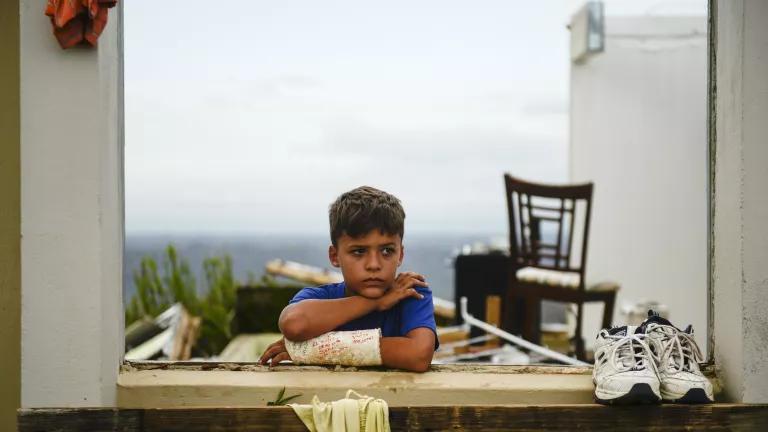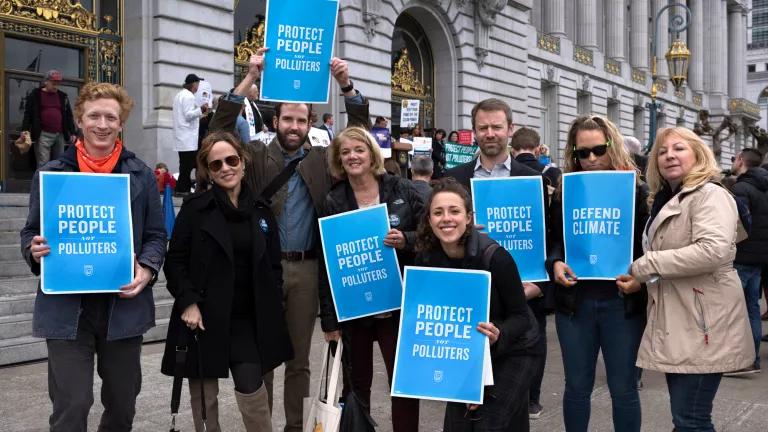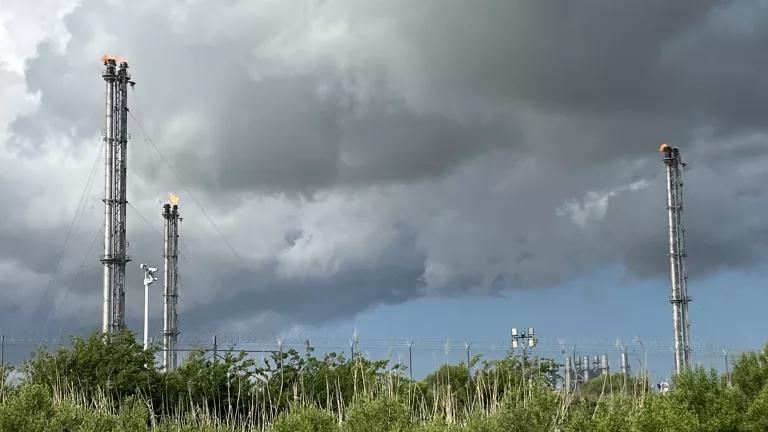Puerto Rico Restoration Must Be Sustainable, Equitable, and Just
As millions still lack basic necessities after the devastation of Hurricane Maria, we must help to rebuild this U.S. territory in every way possible—including addressing the impacts of climate change.

Jake Rios Torres, 9, leans on the ruins of his family home in the mountains above Utuado, Puerto Rico, after it was destroyed by Hurricane Maria.
Two weeks after Hurricane Maria hammered Puerto Rico with 115-mile-per-hour winds and nearly three feet of rain, more than half the island’s 3.4 million American citizens lack clean water. Nine in every ten are without electricity, and 60 percent have no phone service.
Homes, hospitals, and schools have been damaged or destroyed. Food, medicine, and fuel are in short supply. Washed out bridges, battered roads, and fallen trees are hampering the delivery of relief supplies. And while family members across the United States watch from afar as their mothers, fathers, and grandparents suffer, the U.S. response has been widely criticized as slow and inadequate, leaving millions at risk.
By late last week, with mothers wading through waste-deep water to try to secure basic necessities for their children, Carmen Yulín Cruz, mayor of Puerto Rico’s capital city of San Juan, issued a desperate plea for more help from the United States.
The people of Puerto Rico are American citizens. They need and deserve our help. Blaming the victims, belittling their efforts, and criticizing their leaders is the wrong way to go. Here’s what this country must do right now.
First, Congress must pass an immediate aid package to address urgent humanitarian needs, provide emergency disaster relief, and set the stage for recovery and rebuilding efforts that are resilient and equitable.
That means, first and foremost, providing for the health and safety needs of a population in desperate straits. It means cleaning up toxic chemicals from industrial sites, port storage facilities, and sewage systems. It means restoring damaged drinking water treatment and distribution systems and rebuilding an electricity grid that’s been all but destroyed. It means helping to rebuild the island territory in a way that makes it better able to withstand the next tropical storm or hurricane.
It means bringing in community voices up front, in an inclusive and transparent way, to maximize public input and ensure that long-term recovery efforts faithfully reflect local values, priorities, and needs. And it means addressing responsibly the inequities faced by minority and low-income communities that bear a disproportionate share of the ill effects of natural disasters and ongoing environmental degradation.
Part of the plan, too, must help to protect Puerto Rico longer term by addressing the climate change that makes hurricanes and storms more devastating. Warming oceans, for example, pack more energy and moisture into such storms, making them more treacherous when they strike. And rising seas mean greater storm surge that pushes floodwaters ever higher and makes it take longer for those waters to recede once the storm abates.
Puerto Rico’s recovering and rebuilding efforts should reflect those growing dangers, with flood-protection and mitigation features designed into plans for new roads, bridges, hospitals, schools, storm drainage systems, water plants, and homes. And technical expertise, as well as funding, is needed to make sure the island’s new electricity grid can accommodate clean power from the wind and sun.
It’s no wonder climate change is a concern to 84 percent of Latinos in this country, 53 percent of whom say they’ve personally experienced the impacts of climate change and 74 percent of whom say President Trump should do more to address this gathering scourge.
This polling, released last week by the Yale Program on Climate Change Communication, found that Latinos are more engaged, more worried, and more willing to get involved politically on the issue than non-Hispanic Americans. That’s been a consistent trend for some time, and it’s not hard to understand why. Latinos are often among the communities of color and low-income people who tend to bear a greater burden than the rest of us when it comes to environmental ills like the storms, floods, and surging seas made worse by climate change. Latinos are also more likely to experience, personally, the impacts here and abroad.
We just witnessed this in parts of Texas and Florida when hurricanes Harvey and Irma struck, and we’re seeing it now in Puerto Rico.
Maria has devastated this U.S. territory, a two-and-a-half hour flight from Miami. Now we must rebuild Puerto Rico in a way that not only restores our island neighbor but also does so in a way that promises a brighter, more sustainable, more equitable future for its people.



